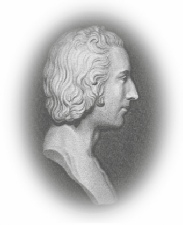
Thomas Muir
100 - 102 Crowhill Road Bishopbriggs Glasgow G64 1RP
“I have devoted myself to the cause of the people.
It is a good cause… It shall ultimately prevail…
It shall finally triumph”
Thomas Muir (Aug 1793)
of Huntershill (1765 – 1799)


Site sponsored by
Thomas Muir Biography
As the leading voice of reform in Scotland, Muir suffered persecution and ultimately transportation for sedition for advocating democratic principles in Scotland when the Pitt-Dundas government feared democratic ideals as a threat to the status quo.
As a national figure associated with the ideals of democracy, Muir was essentially a democrat who believed in the people when the majority were not allowed to vote.
The first political prisoners transported to Australia were convicted in Edinburgh and were known as the "Scottish Political Martyrs."
He was born in 1765.
He attended the University of Glasgow from the age of 10 years and graduated with an MA at the age of 17 years: he was an Advocate in Law at the age of 22 years and practiced law in Glasgow and Edinburgh.
He was a product of the ‘Scottish Enlightenment’ and became a noted reformer and was a leader of Scottish ‘The Friends of the People’, the ‘United Scotsmen’ and a member of the ‘United Irishmen’.
Under his influence parliamentary reform societies were established all over Scotland. Muir was arrested on 4th August 1793, tried in Edinburgh on 30th August, and found guilty of having created disaffection by means of libel and seditious speeches.
He was banished to Botany Bay for 14 years. In 1796 he escaped and made his way to France, hailed as a hero and made a citizen of France.
Thomas Muir and East Dunbartonshire
Muir’s family were originally from Birdston, Kirkintilloch.
His father bought Huntershill House and estate in 1782.
He was an Elder of the Church of Scotland for his home parish of Cadder.
William Muir ‘The Campsie Poet’ was a cousin.
During the 1790s many of the Campsie Parish calico print workers and weavers from Kirkintilloch supported Thomas Muir of Huntershill in his campaigns to establish democracy in Scotland, and a Reform Society’s was set up in Campsie and Kirkintilloch in 1792.
Honours
Thomas Muir was one of the Scottish Martyrs. Five men who were 18th Century political
reformers, in 1793 they were sentenced to transportation to Australia for sedition and writing and publishing pamphlets on parliamentary reform.
They are honoured by two large obelisks, the first in Old Calton Hill Cemetery at 90 feet high dominates the Edinburgh sky-line, the second at Nunhead Cemetery, London is 34 feed high. A Cairn and Martyrs Gate at Huntershill Village, erected by John SL Watson of Huntershill, partly funded by the East Dunbartonshire Council.
There is a permanent exhibition to Thomas Muir at Bishopbriggs library and his contribution to democracy is honoured in the '2000 Years of Democracy' exhibition at the Australian Museum of Democracy (Canberra).
Both exhibitions include a specially commissioned bust of Thomas Muir by Scottish artist Alexander Stoddart.
Thomas Muir bust by
Alexander Stoddart
Muir was an inspiration for Robert Burn’s ‘Scots Wha Hae’
Thomas Muir & Robert Burns
Muir and Robert Burns were contemporaries.
The Muir's trial was being followed in the national and international newspapers.
Many of the ideals Burns expresses in 'A Mans A Man For A That' are ideals Thomas Muir expressed and bravely made public. As an indication of the times these men were living in, Burns cautiously left his song unsigned when it was first printed in 1795.
Burns great anthem for democratic rights was sung at the opening of the Scottish parliament.
Robert Burns wrote 'Scots Wha Hae' on the day Muir's trial started. The letter he wrote with the first draft to George Hamilton (about 30th August 1793) in which he was deliberating the air to 'Scots wha hae', makes it clear who his inspiration was.
Both Muir and Burns were democratic visionaries
Misc
Charges made against Thomas Muir in August 1793.
(a) That he attended meetings at Kirk-in-Tilloch and Milton, of a society for reform, in which he had delivered speeches in which he seditiously endeavoured to represent the government as oppressive and tyrannical.
(b) That he exhorted three people residing in Cadder, to buy and read Paine's Rights of Man.
(c) That he circulated the work of Thomas Paine, A Declaration of Rights, to the friends of reform in Paisley.
Lord Braxfield explained why he was sentencing Thomas Muir and the other leaders of the Convention in Edinburgh to be transported to Australia for fourteen years.
The British constitution is the best that ever was since the creation of the world, and it is not possible to make it better. Yet Mr. Muir has gone among the ignorant country people and told them Parliamentary Reform was absolutely necessary for preserving their liberty.
Thomas Muir, speech made at his trial on 30th August 1793.
What has been my crime? Not the lending to a relation of mine a copy of Mr Paine's work; not the giving away a few copies of an innocent and constitutional publication; but for having dared to be a strenuous and active advocate for an equal representation of the people, in the House of the people.
Thomas Muir, writing to the London Corresponding Society from prison on 24th April, 1794.
The spirit of freedom is not extinguished, but still remains its formal energy, in defiance of the artifices and the violence of despotism. Engaged in the sacred cause of Man, individual man is an atom of little value and when he recollects and contemplates the principles of his conduct, should disdain to use the term suffering. Without a vain affection for myself, I disdain the assumption of extraordinary merit. The man who has acted in obedience to the law of his conscience, has simply discharged his duty.